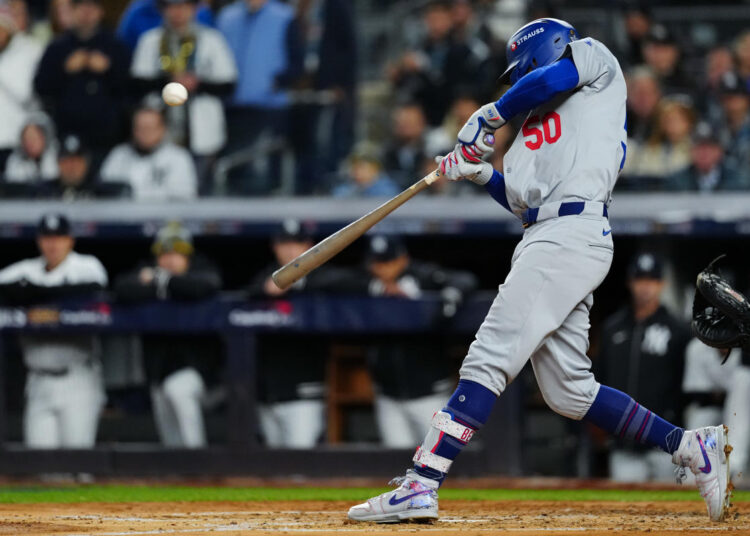NEW YORK — Shohei Ohtani did not look particularly comfortable in Game 3 of the World Series following his shoulder injury in Game 2.
It did not particularly matter for the Dodgers.
Instead, it was a stellar start from Walker Buehler and two timely hits from Ohtani’s fellow MVPs, Mookie Betts and Freddie Freeman, that proved to be the difference in Los Angeles’ 4-2 victory over the Yankees on Monday in the Bronx in Game 3 of this World Series. With that, the Dodgers claimed a commanding 3-0 series lead.
While it was hardly the most explosive display by the Dodgers’ offense — just four runs on five hits — Game 3 still exemplified just how exhausting it is for a starting pitcher to try to navigate the L.A. lineup. Yankees starter Clarke Schmidt walked Ohtani on four pitches to start the game — an instant reminder that even with a hampered shoulder and limited success in the series thus far, Ohtani presents a threat any time he steps in the box.
The first of two lengthy battles between Schmidt and Betts followed, with Betts flying out to left field on the seventh offering from Schmidt. Up came Freeman, ready to further strengthen his case for World Series MVP.
“Thankfully, he threw all three pitches in the first three pitches,” said Freeman, who had never faced Schmidt in his career before Monday. “He went sweeper on the first pitch and then went cutter up, and then he threw the knuckle curve. So I saw all three pitches. I was OK with being down two strikes because I got to see everything he had.”
On the fourth pitch, Schmidt went back to the cutter up and in — a very similar spot from which Freeman had taken a 97 mph fastball from Carlos Rodón way out to right field for a home run in Game 2.
“I don’t think he was trying to throw that cutter in that spot,” Freeman said afterward.
But that’s where that cutter went, and once again, Freeman connected in a big way. The ball exploded off his bat, enjoying the brief journey to the short porch in right field at Yankee Stadium before crashing down into the crowd. Seven minutes into Game 3, the Dodgers had a 2-0 lead, and any positive buzz that had been building in the Bronx vanished.
In the top of the third, it was Betts’ turn to add to the lead, albeit with a much different genre of offensive excellence. After drawing a leadoff walk, Tommy Edman advanced to second on an Ohtani groundout, bringing up Betts to face Schmidt with a runner in scoring position. Monday’s game was also Betts’ first time facing Schmidt in his career. Though Schmidt had gotten Betts to fly out in his first at-bat, he failed to coax a single whiff from the stingy Betts, whose exceptional contact skills remain the core feature of his elite offensive profile.
That trend continued in their prolonged second encounter. Schmidt quickly fell behind 2-0 with a high cutter and a sinker that ran low and inside for ball two. But the right-hander returned to attack mode, hurling the entirety of his arsenal into different portions of the zone in search of a much-needed out as his pitch count climbed. On the ninth pitch, Schmidt went with his high-spin knuckle-curve, but rather than breaking sharply down below the zone, it backed up into the inner-half, where Betts could handle it.
It was hardly the crisp contact Freeman achieved against Schmidt, but Betts connected nevertheless, lofting the ball high over first baseman Anthony Rizzo’s head before it plopped into the grass just inside the right-field line in front of Juan Soto, allowing Edman to race around and score the Dodgers’ third run.
Schmidt had tried everything and even yielded weak contact from Betts — his RBI single had a measly 71.2 mph exit velocity — but it wasn’t good enough. Of the 68 pitches Schmidt threw in his abbreviated outing in Game 3, 16 of them, or 23.5% — three sweepers, four sinkers, four knuckle-curves and five cutters — were deployed across his two showdowns with Betts.
“That was one of the at-bats that set the tone,” Dodgers manager Dave Roberts said afterward. “Tommy did a great job reading the ball off the bat, going on contact, scoring right there. But that at-bat to just kind of win pitches, get down with two strikes and to keep fighting to still drive in a run — we did that all night.
“I thought we took really good at-bats. Mookie kind of sets the tone with that.”
In the bottom of the fourth, it was Betts’ glovework that prompted another sigh of disappointment from a Yankee Stadium crowd seeking any reason to get excited. With Giancarlo Stanton on second base, Jazz Chisholm Jr. smoked a line drive toward Betts in right field. Betts’ initial jump suggested he expected the hard-hit ball to carry more toward the right-center-field gap, but the ball had immense amounts of topspin, sending it careening to the ground with unusual velocity.
This forced Betts to make a last-second decision to either stay upward and play the ball on a hop, yielding the hit, or make a desperate, diving attempt to snare the ball — with the risk of it bouncing past him and no one backing him up.
With six Gold Gloves and an exceptional combination of athleticism, coordination and confidence, Betts opted for the latter, diving forward and snatching the ball just above the grass for a nifty second out.
With two championships and a wealth of accolades already amassed over his 11-year career, Betts has little left to prove; his status as one of his generation’s greatest players and a likely future Hall of Famer is solidly secure. But for a player who understands the sky-high expectations for both himself and his high-profile team, Betts’ standout postseason is a refreshing bit of redemption following his two most recent trips to October, which were hardly a reflection of his talent.
Betts went 2-for-14 in the Dodgers’ NLDS loss to San Diego in 2022 and 0-for-11 against Arizona in Los Angeles’ shocking NLDS exit in 2023. Holding such a small sample against the superstar is surely unfair, but as one of the faces of this franchise, his lack of impact the past two Octobers lingered into the winter after Dodgers campaigns that ended in disappointing fashion.
This current run, which has L.A. within one win of a World Series, is much more reminiscent of Betts’ first October in Dodger blue back in 2020, when the team stormed through the expanded postseason field and won the franchise’s first championship since 1988. While Corey Seager’s epic showing earned him MVP honors in both the NLCS and World Series, Betts was a steady and productive presence as L.A.’s leadoff man, hitting .296/.378/.493 in 18 games with two home runs, both in the World Series against Tampa Bay.
This October, Betts is hitting .291/.394/.582 with more walks than strikeouts while consistently showcasing top-tier glovework in right field. He has hit four home runs in 13 games, the same amount he had in 58 career postseason games before 2024. Thanks to Tommy Edman’s breakout NLCS and Freeman’s World Series power surge, Betts is unlikely to collect any individual postseason hardware. But his constant contributions on both sides of the ball are a huge reason the Dodgers are one win away from the only accolade anyone in their clubhouse cares about.
“He’s Mookie Betts,” Freeman said after Game 3. “I think everyone was a little worried [after] those first couple games in San Diego in the LDS” — when Betts went 0-for-6, another tiny sample of failure, indicative of the standard to which he’s held — “but we all know, it’s Mookie Betts. He’s one of the best players of all time.”
Betts has understood the assignment for the 2024 Dodgers from the very beginning. At the team’s FanFest in early February, following a historic offseason packed with big-name acquisitions, Betts did not shy away from what would be expected of a team with a roster featuring such an overwhelming amount of star-level talent.
“It’s World Series or nothing,” he said then. “You know it’s gonna be tough. Every game is gonna be the other team’s World Series. It is what it is, but we signed up for it. We have to embrace that.”
Of course, there were some twists and turns and turbulent times along the way. But the 2024 Dodgers amassed baseball’s best record in the regular season and are now on the verge of sweeping the team with the best record in the American League to accomplish that sky-high goal set for themselves all those months ago.
For Betts, it was World Series or nothing — and if his recent play is any indication, nothing was never really an option. For Freeman — who has all but locked up World Series MVP, should the Dodgers indeed secure the fourth and final victory in the coming days — adding to his personal award collection means little in comparison to the collective goal that remains in front of his team.
“I really just want to hoist that trophy,” he said. “I don’t care how that happens. I don’t care if I go 0-for-the-next-70 with 70 strikeouts. As long as we win, that’s all I care about.”
Read the full article here


























Discussion about this post